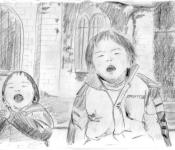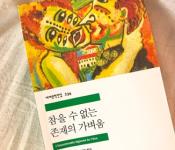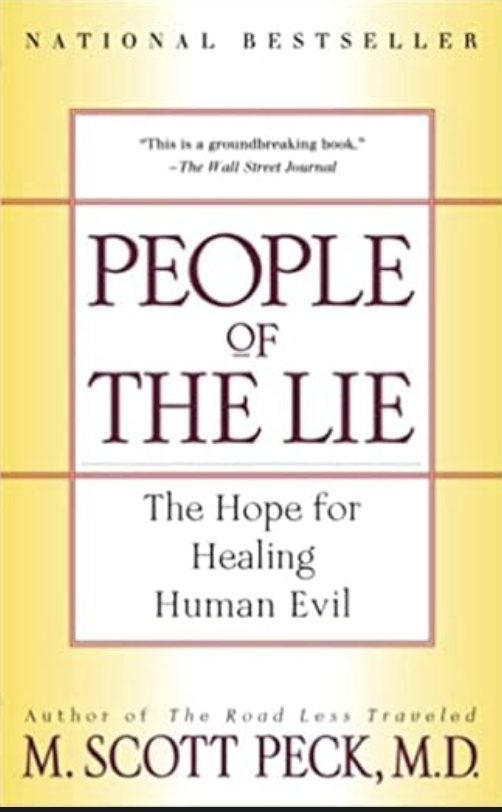<창칼 33> 어쩌면 악한 사람은 아주 가까이에 있을지 모른다
Shortcut
PrevPrev Article
NextNext Article
Shortcut
PrevPrev Article
NextNext Article

Living our lives, we often encounter situations where unexpectedly harsh treatment comes from seemingly ordinary and normal individuals. Whether it's betrayal or unjust accusations, sometimes the source of cruelty can be quite surprising. Additionally, there are cases where individuals who are overly diligent in their assigned tasks unexpectedly harm many people as a result.
Books have shed light on the fact that seemingly ordinary individuals can unexpectedly become agents of evil. One such book is "People of the Lie" by Scott Peck, a psychiatrist, which explores the psychological issues of evil individuals encountered in everyday life from the perspective of self-proclaimed evil psychology. Another is Hanna Arendt's "Eichmann in Jerusalem: A Report on the Banality of Evil," better known under the subtitle "Banality of Evil," which exposes how ordinary people, so seemingly inconspicuous, can cause great harm to society.
Dr. Scott Peck, also the author of the bestselling book "The Road Less Traveled," analyzes individuals who disrupt human relationships in everyday life and ultimately make the lives of those around them difficult or even bring them to ruin in his book "People of the Lie." Such individuals tend to hide their vulnerable or wounded egos formed during their developmental stages by setting up morally superior egos, cloaking themselves in self-righteousness, arrogance, and a sense of superiority. They often take on the guise of narcissists, judging or criticizing others based on their own ethical standards, and sometimes ridicule those who do not conform. They may even resort to manipulation and blame-shifting to protect themselves or to portray their flaws or wrongdoings onto others.
A common tactic that such individuals use is projection, which deflects one's own flaws onto others or blaming them for personal issues. This behavior, noted by Scott Peck, can cause significant distress to those affected, as detecting their intentions and truths isn't easy. Additionally, treating these individuals is often ineffective as they rarely acknowledge their own flaws, highlighting a dilemma in their lack of self-awareness.
Eichmann in Jerusalem, written by German philosopher Hannah Arendt, exposes the actions of Adolf Eichmann, a real historical figure, who was at the pinnacle of the Holocaust, responsible for the mass murder of millions of Jews under Nazi rule. Eichmann, as portrayed in the book, was simply a faithful bureaucrat who believed that faithfully following government directives, regardless of their purpose, was a sign of loyalty to the state and the duty of a bureaucrat. He functioned like a mere cog in a giant machine, devoid of any ethical consciousness or critical thinking, executing tasks as instructed without any consideration of the consequences. Stories like this may seem like someone else's problem, so people might just think, "Oh, it must be like that," and brush it off. However, when they directly encounter such people in their surroundings, they come to fully realize the hardship involved.
Arendt, who covered Eichmann's trial, where he showed no remorse, vividly demonstrates how ordinary people can unknowingly commit great evils. Looking around, one might realize that such individuals could be oneself or close colleagues at work. They could be conscientious professionals, obediently carrying out their duties, or even public officials such as soldiers or police officers.
These books highlight different types of evildoers but share commonalities. Firstly, evil isn't necessarily perpetrated by distant or inherently sinister deomon, but can emerge from ordinary individuals in everyday life, including oneself, often unknowingly causing harm to others. Secondly, both types of individuals lack self-reflection and self-awareness, unable to gauge the origins of their behavior or understand how it may negatively impact others. Personally, I've recently encountered an individual embodying a combination of these types – a dangerous mix of self-righteous narcissism and obedient conformity – resulting in significant irreparable repercussions and damages.
While everyone carries wounds and vulnerabilities, those trapped in the clutches of an entrenched ego may lose opportunities for growth and correction. Beyond this egoic entrenchment, societal factors like rigid thinking and dogma, as well as the idolization of absolutism, can contribute to evil.
Ultimately, Scott Peck suggests that the path to overcoming evil lies in reclaiming integrity through love, yet a more practical solution involves cultivating self-awareness, introspection, and empathy.
It's time to assess where one stands on the spectrum of good and evil and measure one's level of self-awareness.
(Tranlsated by ChatGPT 3.5)
-

-
 The Face of Evil (악의 얼굴), 아돌프 아이히만의 재판 과정을 다룬 다큐멘터리:The Adolf Eichmann Trial - Justice in Jerusalem | Free Documentary History
The Face of Evil (악의 얼굴), 아돌프 아이히만의 재판 과정을 다룬 다큐멘터리:The Adolf Eichmann Trial - Justice in Jerusalem | Free Documentary Historyhttps://youtu.be/vLfvJUvsVaI?si=SZbUuXXaiLX5k3Hk
-
 개인적으로 사람을 기독교적인 선과 악의 이분법으로 나누는 것을 좋아하지 않지만, 임상 경험을 통해 밝힌 '은밀한 악의 행위'에 대한 스콧 펙 박사의 분석에는 공감이 많이 갑니다. 실질적으로는 누구나가 자기 성찰이 약할 때 악의 행사자가 될 수 있다는 점에서, 사람에게 누구나 있는 선과 악의 요소들을 연속체의 스펙트럼으로 놓고 보는 안목이 필요한 것 같습니다.일상에서 인격 장애자들 외에 인정 욕구에 대한 과도한 요구를 표출하는, 소위 관심종자 (=관종)들도 접하게 됩니다. 이들을 피할 수 있다면 피하는 게 가장 좋은 방법이지만, 피하지 못하는 상황인 경우에는 이들에게 1) 일관적인 단호함과 2) 우호적 무관심이 좋은 대처 방법이라고 하네요. 우호적 무관심이란 적대적으로는 대하지 않되 관심을 끊는 것을 말합니다.
개인적으로 사람을 기독교적인 선과 악의 이분법으로 나누는 것을 좋아하지 않지만, 임상 경험을 통해 밝힌 '은밀한 악의 행위'에 대한 스콧 펙 박사의 분석에는 공감이 많이 갑니다. 실질적으로는 누구나가 자기 성찰이 약할 때 악의 행사자가 될 수 있다는 점에서, 사람에게 누구나 있는 선과 악의 요소들을 연속체의 스펙트럼으로 놓고 보는 안목이 필요한 것 같습니다.일상에서 인격 장애자들 외에 인정 욕구에 대한 과도한 요구를 표출하는, 소위 관심종자 (=관종)들도 접하게 됩니다. 이들을 피할 수 있다면 피하는 게 가장 좋은 방법이지만, 피하지 못하는 상황인 경우에는 이들에게 1) 일관적인 단호함과 2) 우호적 무관심이 좋은 대처 방법이라고 하네요. 우호적 무관심이란 적대적으로는 대하지 않되 관심을 끊는 것을 말합니다. -
?
창공님, 좋은 관점 잘 읽었네요. 특히, 한나 아렌트의 "악의 평범성"에 대한 주장은 평상시에도 섬뜻 떠오르게 되는 생각이거든요. 평범한 사람에게도 아무 생각없이 자기 일에만 몰두하다보면, 그럴 위험이 있다는 이야기잖아요. 창공님이 말한대로, 그럴 위험에 빠지지 않기 위해서 사람들은 끊임없는 자기 객관화나 성찰이 필요하다는 말에 공감합니다. 어떤 철학자가 그러더군요, 그럴 위험에 빠지지 않기 위해서는, 자기가 하고 있는 일이나 태스크의 목적이 무엇인지 끊임없이 고민해야 한다고요. 그렇지 않으면 그럴 위험에 빠지게 된다는 거죠. 도올 김용옥에 대해서 호불호가 많지만, 그가 어느 강연에서 한 말이 기억이 나네요. 그의 열정은 고착화된 사고에 저항해 나가는 거라고...
-

끊임없이 태스크의 목적을 생각해야 한다는 말씀, 공감하며 제 글의 취지이기도 합니다. 쉽게 말해서 내가 하는 일이 뭐가 됐든, 공익을 위한 일인가 아니면, 소수나 개인의 욕망 충족 혹은 불순한 이권을 위한 것인가를 늘 고민해야 한다는 것인데요. 양심이 먹구름으로 살짝 가려지거나 맹신으로 눈앞이 가려졌을 때 이에 둔감해져 버리는 게 또 인간의 취약성인 것 같습니다. 몸의 온전함 > 정신의 온전함 > 영혼의 온전함으로 이어가는 것도 하나의 메카니즘일 텐데요, 그래서 오늘도 우리는 부단한 움직임 속에서 몸과 마음의 온전한 작동을 꿈꿉니다.
-
신년 산행은 왜 설레는가 6
-
서부여행 지도 만들었습니다. 3

-
OPUS-I & II 5

-
오늘은 슬프지만 그래도 희망의 내일을 꿈꿔 봅니다 14

-
<창칼 38> 내 안의 야만성을 찾아서 4

-
소주 마시고 가출해 여행을 해야하는 이유. 10

-
<창칼 36> 참을 수 없는 존재의 얄팍함 9

-
단오와 히레사케 7

-
<창칼 33> 어쩌면 악한 사람은 아주 가까이에 있... 5

-
개기 일식과 달 3
-
<창칼 30> 30회 특집 인터뷰 7

-
<창칼 27> 제 눈에 안경과 정신 승리 3

-
<창칼 23> 물 흐르듯 거침없이 9

-
<창칼 22> 로드와 여섯 친구들과의 만남 31

-
<창칼 20> 발바닥 사랑과 별과 팔레스타인 8

-
<창칼 19> 짜라퉁은 이제 짐 싸고 물러가라! 5
-
<창칼 16> 별(別)얘기 아닌 별 이야기 14

-
(가상현실) 분쟁조정 위원회 회의 6

-
<창칼 15> 길들여지길 거부하고 거친 야성으로 ... 7

-
Bay 12景 6

 단오와 히레사케
단오와 히레사케
 개기 일식과 달
개기 일식과 달



















https://a.co/d/6MIBGbH2. 예루살렘의 아이히만 (악의 평범성) by Anna Arendt (2006)
https://a.co/d/0KnZX89